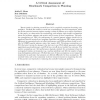Free Online Productivity Tools
i2Speak
i2Symbol
i2OCR
iTex2Img
iWeb2Print
iWeb2Shot
i2Type
iPdf2Split
iPdf2Merge
i2Bopomofo
i2Arabic
i2Style
i2Image
i2PDF
iLatex2Rtf
Sci2ools
JAIR
2002
2002
A Critical Assessment of Benchmark Comparison in Planning
Recent trends in planning research have led to empirical comparison becoming commonplace. The eld has started to settle into a methodology for such comparisons, which for obvious practical reasons requires running a subset of planners on a subset of problems. In this paper, we characterize the methodology and examine eight implicit assumptions about the problems, planners and metrics used in many of these comparisons. The problem assumptions are: PR1 the performance of a general purpose planner should not be penalized biased if executed on a sampling of problems and domains, PR2 minor syntactic di erences in representation do not a ect performance, and PR3 problems should be solvable by STRIPS capable planners unless they require ADL. The planner assumptions are: PL1 the latest version of a planner is the best one to use, PL2 default parameter settings approximate good performance, and PL3 time cut-o s do not unduly bias outcome. The metrics assumptions are: M1 performance degrades si...
| Added | 22 Dec 2010 |
| Updated | 22 Dec 2010 |
| Type | Journal |
| Year | 2002 |
| Where | JAIR |
| Authors | Adele E. Howe, Eric Dahlman |
Comments (0)

